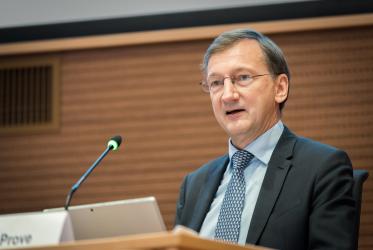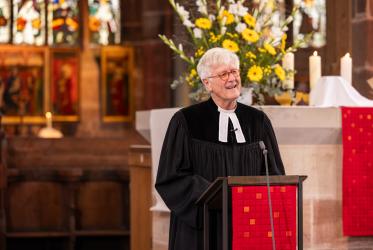It is my special role and privilege to offer some closing words to this most fruitful exchange on how communities of faith can contribute to eradicating the scourge of the coronavirus pandemic and mitigating its tragic toll. No task is more urgent, nor more daunting.
I offer first my sincere thanks to all of you who are participating in this important conversation, for seeing the enormous need for, and mapping the tremendous potential of, communities of faith to partner with governmental programmes and international agencies in addressing the global pandemic.
Much is being done, but so much remains.
In some ways we need to replicate the amazing partnerships and structures that were forged after World War II to help relocate and resituate millions of refugees and to lay the groundwork for a durable postwar peace.
If I may venture a kind of summary of our discussions, I would say that:
- We must acknowledge the special role that religion and religious communities—whether Christian or Jewish, Muslim or Hindu--continue to play in the world. I have personally witnessed the dramatic ways in which churches, for example, in Africa and around the world, have stepped up to lead in this pandemic.
- We must recognize that religious actors and communities of faith not only console victims and bind up wounds. They also bring endless supplies of unselfish commitment to the practical work of building and maintaining institutions of benevolence and to the hard work of justice and peace.
- Even more, communities of faith create and nurture the self-giving love that is indispensable to our age of competition forlimited resources, stark choices, and enormous need.
- This crucial gift of religious communities can also be key to creating and nurturing the willingness for deep systemic change that is the single greatest need today to fully address not just the pandemic but also climate justice, gender justice, massive inequalities, violence, and racism.
- I believe that in this pivotal time the world desperately needs a movement, force, or element for change that is not self-serving, nor discriminatory, nor provincial nor ideological. One that stands for all forms of peace and justice, and works selflessly to help lift the world from its peril. Through passionate and self-giving faith, religious persons can transcend self-interest, group interest, and national interest to strive for the common and transcendent good. Almost uniquely, they can nurture that trust and willingness to change.
- We in the World Council of Churches labour to harness this energy and nurture this flame by being a catalyst for collective action, advocacy, and service in partnership with you.
- That is why we are so hopeful as we plan to meet in Karlsruhe next year at the WCC’s 11th Assembly. We have every expectation that it will be a creative workshop for strategic reflection and forging effective and consequential action by churches and allies in the coming years.
With that in mind, I invite your participation in the assembly, your ideas for partnering with us, and your collaboration in the ongoing work of the World Council of Churches for the sake of humanity and its future on this planet.





